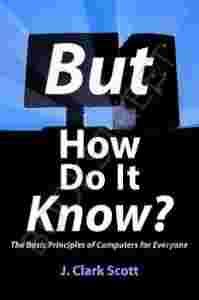|
Finally, this brand new book exposes the secrets of
computers for everyone to see. Its humorous title begins
with the punch line of a classic joke about someone who
is baffled by technology. It was written by a 40-year
computer veteran who wants to take the mystery out of
computers and allow everyone to gain a true
understanding of exactly what computers are, and also
what they are not. Years of writing, diagramming,
piloting and editing have culminated in one easy to read
volume that contains all of the basic principles of
computers written so that everyone can understand them.
There used to be only two types of book that delved into
the insides of computers. The simple ones point out the
major parts and describe their functions in broad
general terms. Computer Science textbooks eventually
tell the whole story, but along the way, they include
every detail that an engineer could conceivably ever
need to know. Like Baby Bear's porridge, But How Do It
Know? is just right, but it is much more than just a
happy medium. For the first time, this book thoroughly
demonstrates each of the basic principles that have been
used in every computer ever built, while at the same
time showing the integral role that codes play in
everything that computers are able to do. It cuts
through all of the electronics and mathematics, and gets
right to practical matters. Here is a simple part, see
what it does. Connect a few of these together and you
get a new part that does another simple thing. After
just a few iterations of connecting up simple parts -
voilà! - it's a computer. And it is much simpler than
anyone ever imagined. But How Do It Know? really
explains how computers work. They are far simpler than
anyone has ever permitted you to believe. It contains
everything you need to know, and nothing you don't need
to know. No technical background of any kind is
required. The basic principles of computers have not
changed one iota since they were invented in the mid
20th century. "Since the day I learned how computers
work, it always felt like I knew a giant secret, but
couldn't tell anyone," says the author. Now he's taken
the time to explain it in such a manner that anyone can
have that same moment of enlightenment and thereafter
see computers in an entirely new light.
|
|

